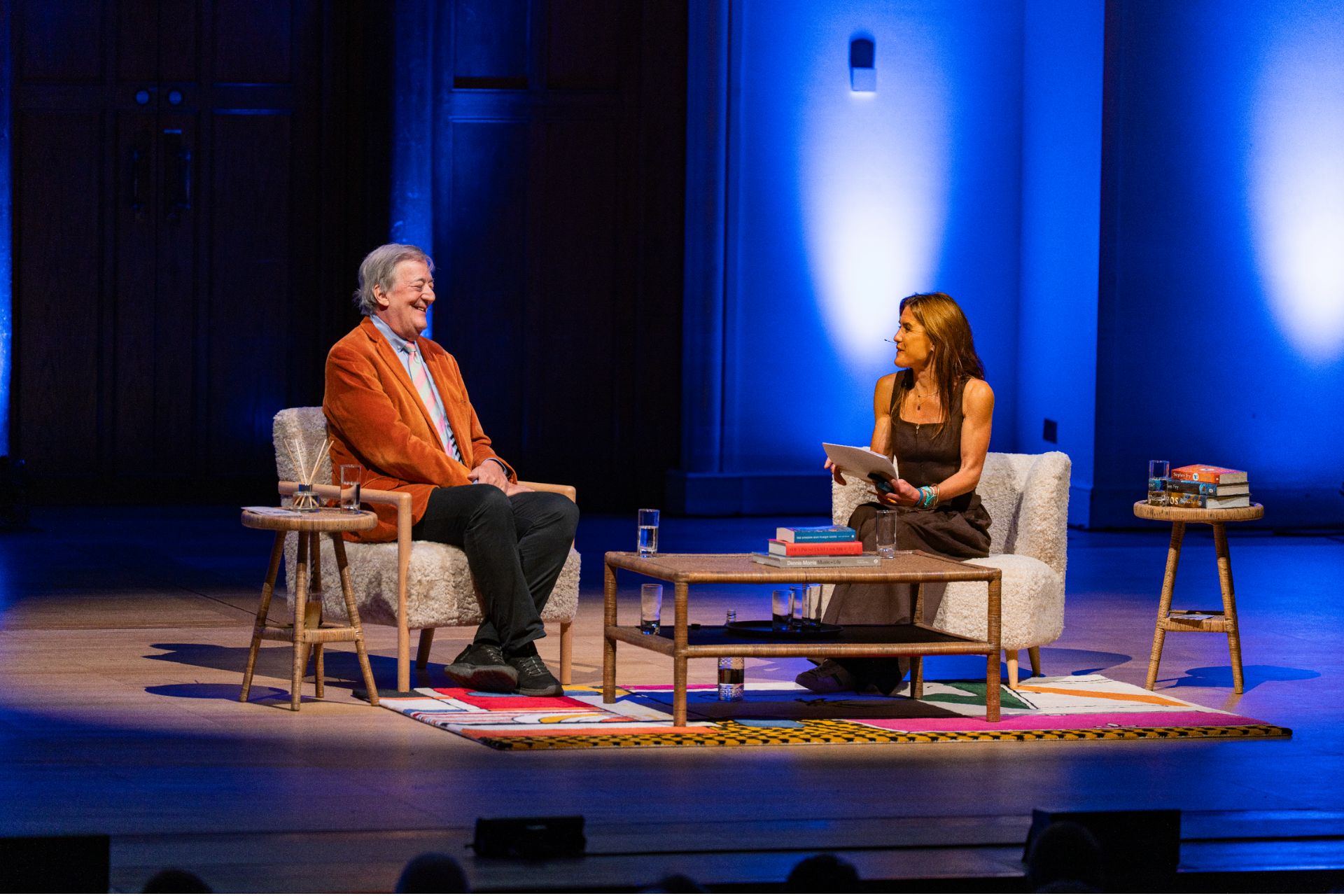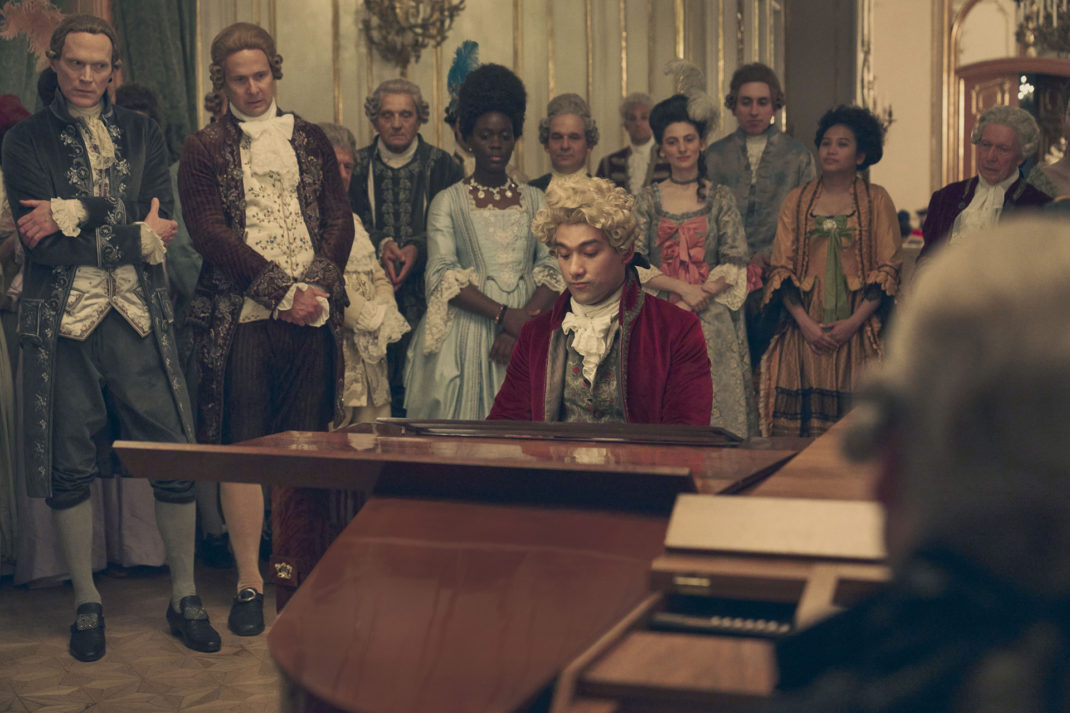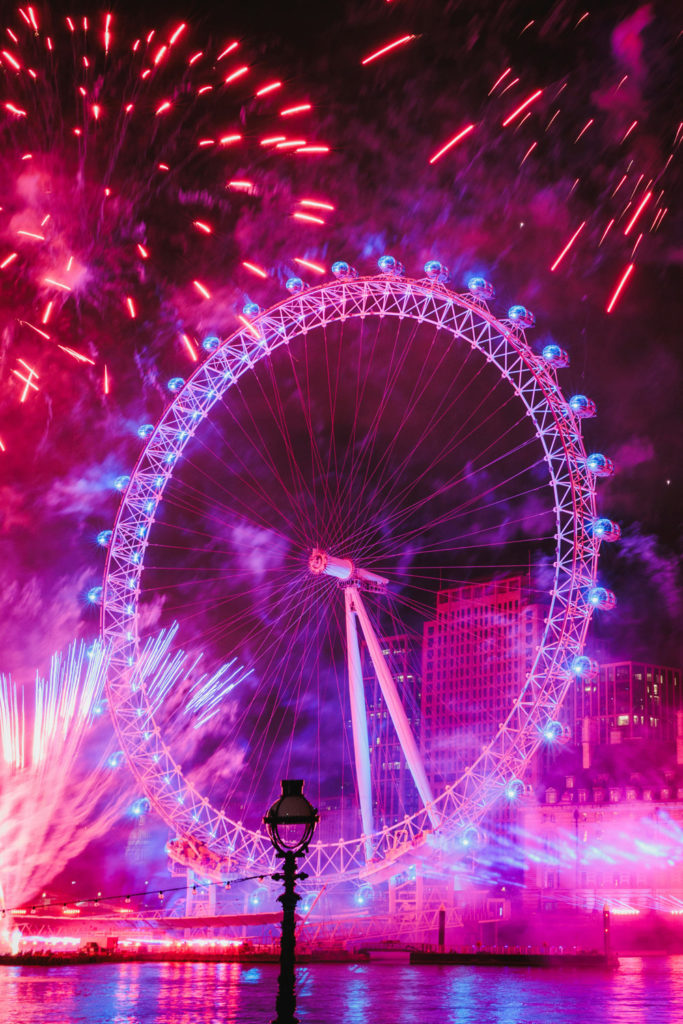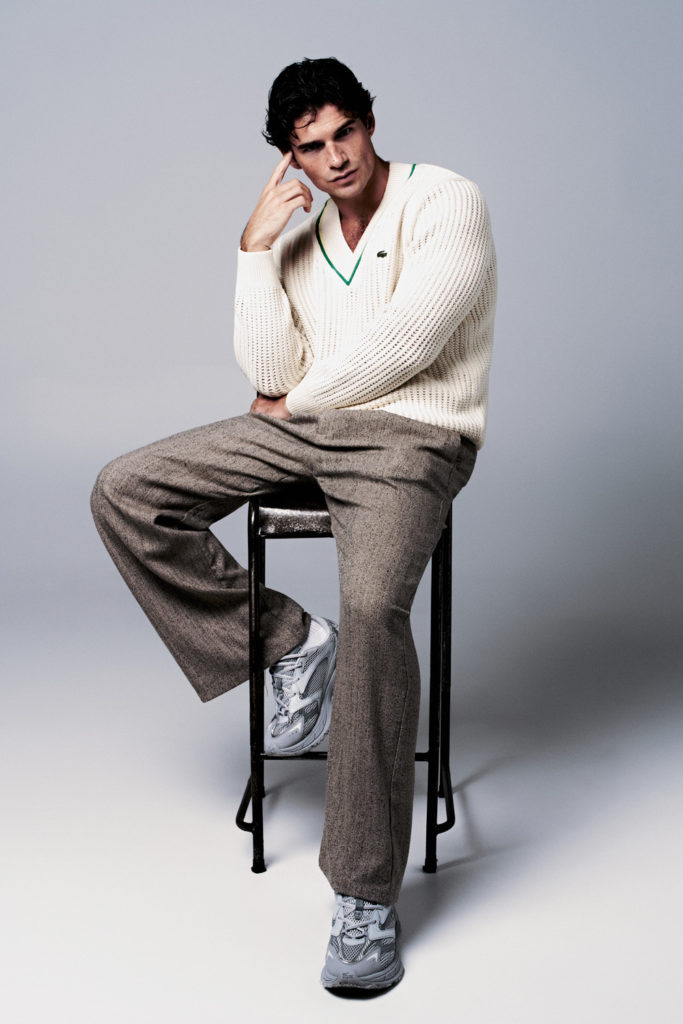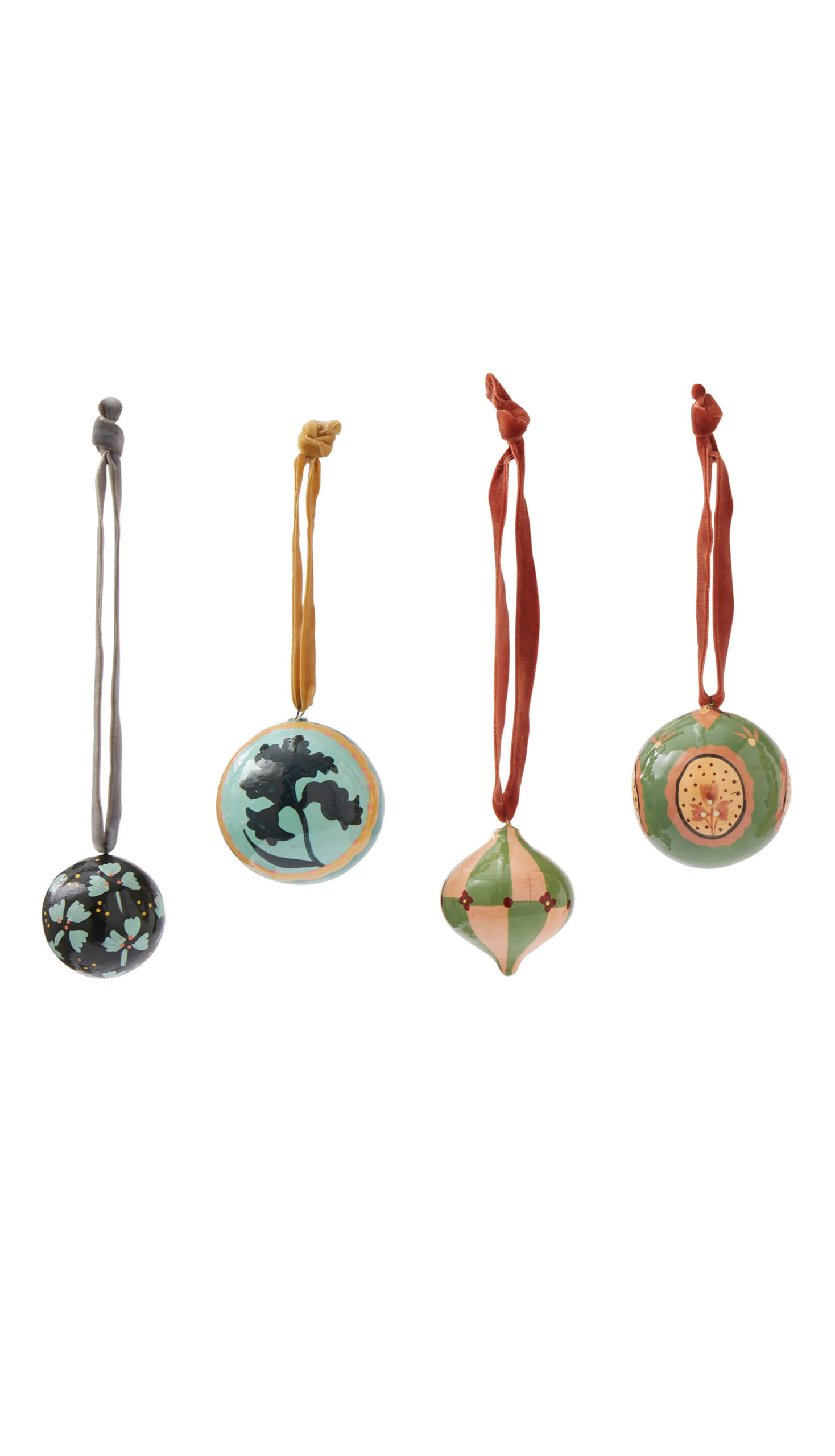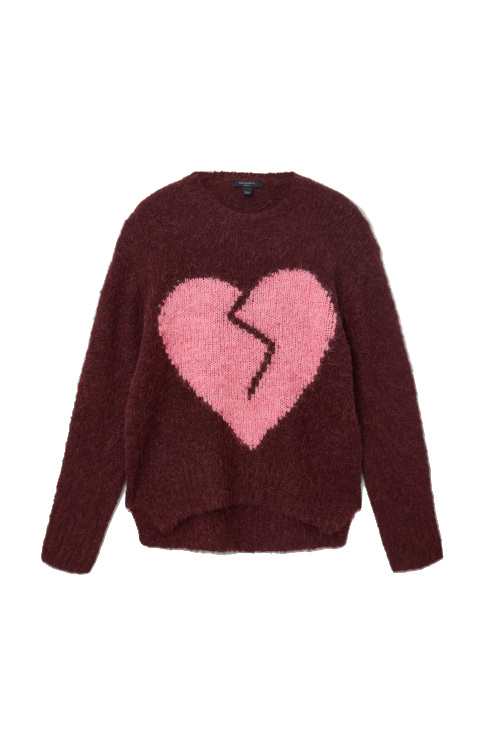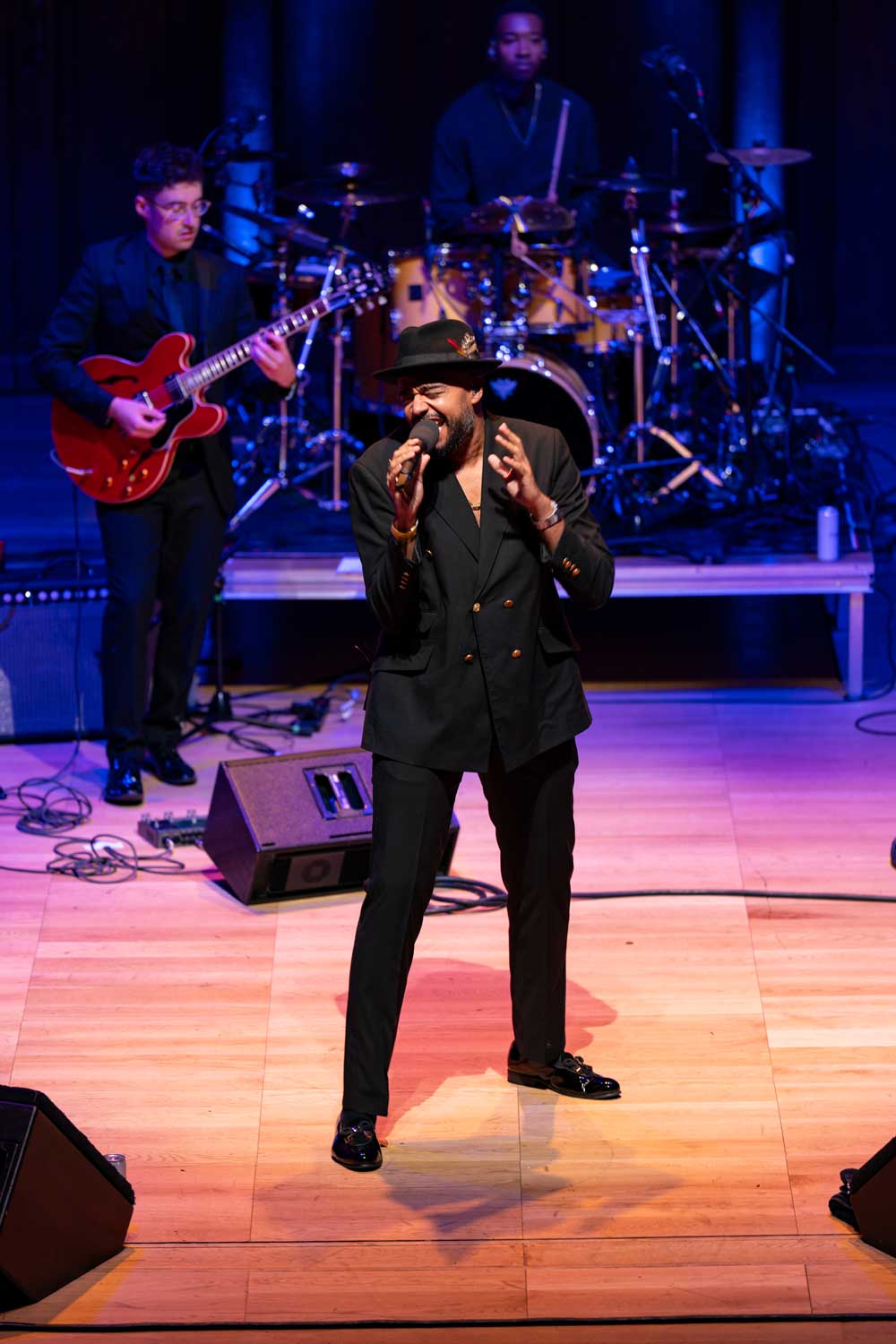
Chelsea Arts Festival: Day Two Review
By
3 months ago
Everything that happened on the second day of the inaugural arts and culture festival.
Yesterday Chelsea Arts Festival was in full flow for day two. The line-up included Sir Stephen Fry and author William Boyd, a first ever live performance from poet Lucas Jones and a live jazz concert in collaboration with Ronnie Scott’s, plus much more. Read the C&TH editorial team’s recap of day two of the festival.
Here’s What Happened At Chelsea Arts Festival 2025, Day Two: 19 September
The bandstand on Duke of York Square was brought to life yesterday afternoon as Chelsea Arts Festival entered its stride for day two. Painting sessions took place at Art Play all day long (book your weekend slot here) and come evening Raising Hare author Chloe Dalton and nature essayist Gareth Howell-Jones delighted a captivated audience at John Sandoe Books. Here’s what else happened on Chelsea Arts Festival day two.
Blue Plaques Talk Back Live: Sir Stephen Fry, Lyse Doucet OBE, Dennis Morris & Kathryn Hughes
Day Two of Chelsea Arts Festival opened with the first ever Blue Plaques Live at Cadogan Hall, hosted by Hannah MacInnes. You could have heard a pin drop as four stories of some of Chelsea’s – even if sometimes fleetingly so (George Eliot lived here for just a few weeks) – most famous residents’ lives were brought to life through Story Stocks’ Blue Plaques Talk Back session. Sir Stephen Fry shared how his lifelong passion for Oscar Wilde began when, as a boy, he first encountered The Importance of Being Earnest: ‘I learned it almost by heart… It’s the unity that makes it perfection’. Fry spoke movingly about how Wilde’s story of brilliance and persecution resonated with him as a young gay man: ‘Reading Wilde’s story made my heart sink… yet it vindicated and validated me. I felt less alone.’
The morning also celebrated other legendary Chelsea residents: biographer Kathryn Hughes explained why George Eliot chose Chelsea, recalling how from Cheyne Walk she could, ‘see the Thames… and beyond that fields that reminded her of home.’
Photographer Dennis Morris told us how Bob Marley, recovering from an assassination attempt, wrote Exodus, Jamming, Waiting in Vain, Three Little Birds and One Love at 84 Oakley Street. Morris’s now-iconic images of Marley helped define reggae’s visual legacy.
And finally, the BBC’s Chief International Correspondent Lyse Doucet reminded us of Martha Gellhorn, the trailblazing war reporter too often remembered only as ‘Mrs Hemingway’, who lived for a time on Cadogan Street. Gellhorn smuggled herself onto a D-Day barge and got to the Normandy beaches before Hemingway, determined to tell the human stories of war. ‘There is no replacement for on-the-ground, face-to-face journalism,’ said Doucet, echoing Gellhorn’s ethos. By Lucy Cleland
A Creative Renaissance? AI & The Future of Imagination With Omar Karim, Dr Shama Rahman & Suhair Khan
For Saatchi Gallery’s first Chelsea Arts Festival event, four leading voices in the technology sector came together to discuss one of the most hotly debated issues of our time. Can artists and AI work together to create truly meaningful work? For AI filmmaker Omar Karim, the answer is a resounding yes: ‘My creative practice has allowed me to create far beyond the boundaries of the traditional way of making products.’ From ‘reprogramming’ viewers of a film to do more acts of kindness, to healing inner wounds by speaking to an AI that acts like a mother, AI unlocks incredible possibilities, Karim told the audience.
The best way to approach AI is to use it as a thinking partner, said Dr Shama Rahman, neuroscientist and creative tech entrepreneur. We have an opportunity to allow AI to ‘take a hand in our own evolution’ – improving our memory, creativity and decision-making. The key is always asking ‘why are we utilising AI here?’, she added, ‘and helping us visualise more interesting things rather than just using it as a production monkey.’
Rest assured though: AI will not take over the entire creative industries and destroy wholly human-created art, believe the panel. ’I don’t want to see everything made with AI,’ admitted Freya Salway from Google Arts & Culture. ‘Art created without AI will continue. We’re always focused on the importance of the human in the link, because that’s when you get something meaningful.’ But, as all four agreed, at some point as humans, we’re going to have to accept that we will live alongside machines. By Evie Calver
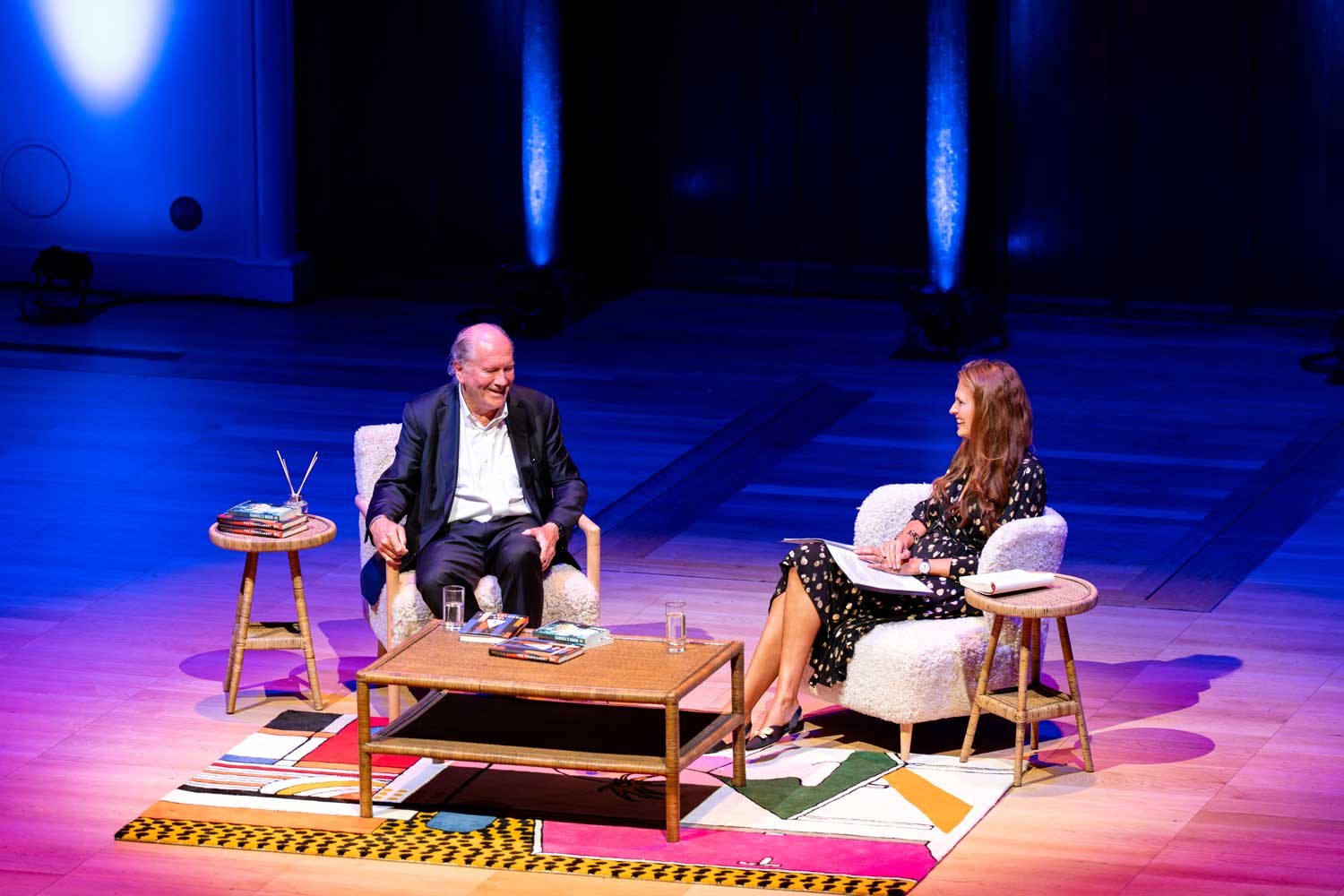
William Boyd
In Conversation With William Boyd
Wary of sitting like Trump – don’t worry, he didn’t – spy novelist William Boyd took to the stage at Cadogan Hall with C&TH arts writer Olivia Cole to discuss his new thriller The Predicament. Renowned for his strong imagination and thorough research process, Boyd’s description of the Filipino town Manila in The Blue Afternoon successfully convinced a local that he must have lived in the area – despite never even making a visit. While he has a storied life to draw from – having grown up in Ghana and educated at the same infamously Spartan boarding school as the King – it is not his own life which fascinates him, but the insights he gained as an outsider in both worlds.
Confirming that he’s never eaten a seagull, admitting that his early works were perhaps a touch heavy on the male gaze, and discussing his revelation that writing from the perspective of a woman is no different to that of a man’s, the conversation took the eager crowd through a myriad of subjects. Unlike many of his fellow spy writers, Boyd at least claims to have no connection to espionage beyond the belated discovery that his wife’s cousin was married to the head of MI6. Ironically for a man who secured his first book deal on the back of the lie that his novel was already written (it was not), he doesn’t think he could cope with the lack of trust.
Though enigmatic on John F Kennedy conspiracies (he’s convinced there were two shooters) and the Cambridge Five, it was his discussions of Chelsea which really enraptured the crowd. A native to the area, both his characters, and many other authors’ fictional spies, tend to share a SW postcode. Reminiscing about the Chelsea of the past, he recalls popping into the famous Cafe Picasso (reimagined as Matisse in his books), only to discover Maggie Smith, Peter Blake, Bob Geldof and Gordon Ramsey sat inside: ‘Where else would you have got that kind of eclectic mix?’ By Isabel Dempsey
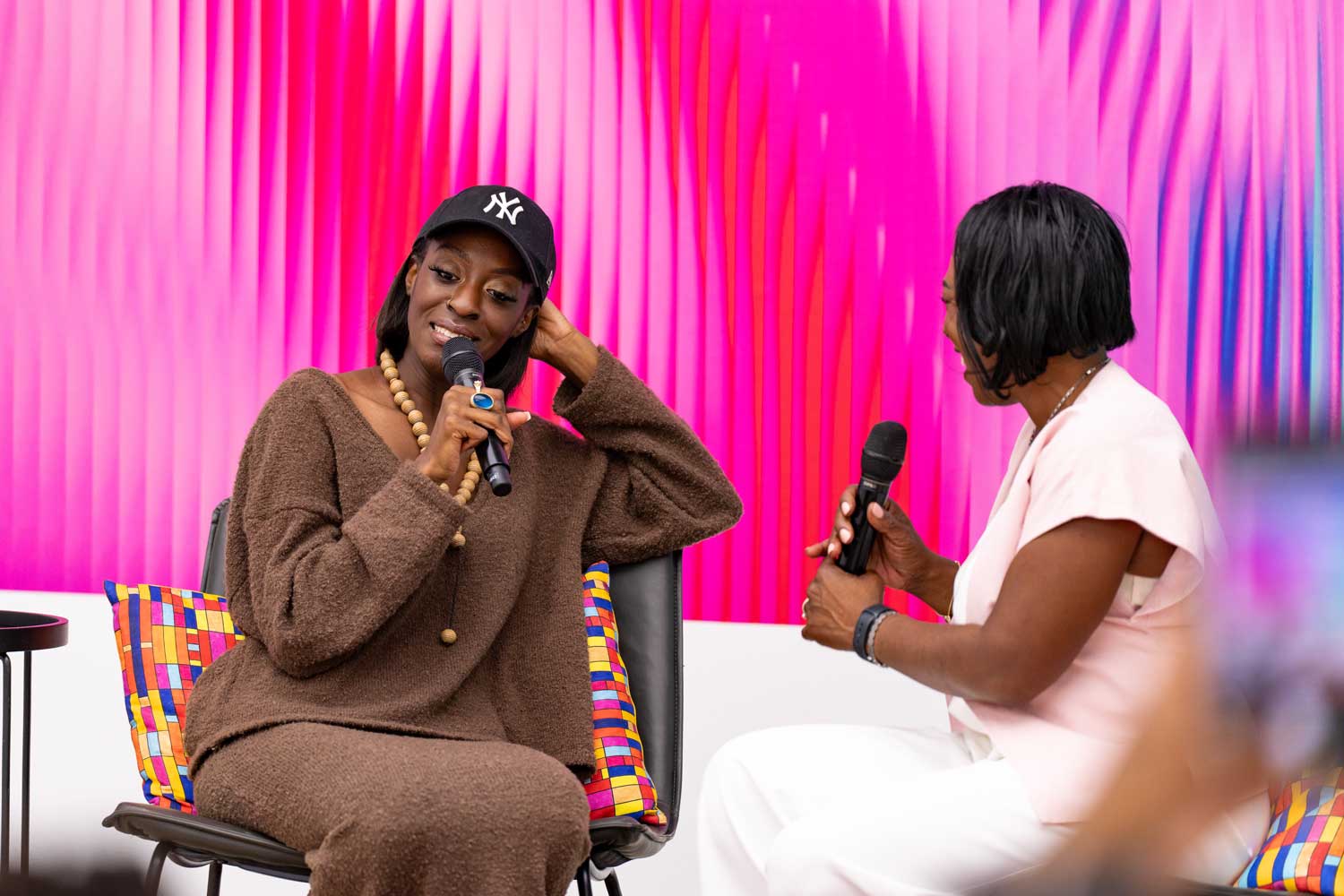
Sheila Nortley
Sheila Nortley In Conversation With Davina Forbes-Williamson
Producer and writer Sheila Nortley mapped out the career that took her from short films to Netflix’s super-successful Supacell in her Friday afternoon Chelsea Arts Festival conversation at Saatchi Gallery with Forbes Family Group’s Davina Forbes-Williamson. The audience was closely held by the pair as they discussed the producer’s career to date, including work to provide representation opportunities for Black creatives in the UK. From ghost stories to on-set wellbeing, this was a practical talk that managed to be at many times both empowering and vulnerable. ‘I was told the project would be more commercial if the couple were white,’ said Nortley, on an upcoming project she has written, based on her own experience with the loss of a childhood sweetheart.
‘As a Black producer I want to contribute to this renaissance we are seeing – and film and TV is one of the best ways,’ Sheila summarises. Where she faces barriers, Sheila creates her own opportunities – and thus for others from the diaspora – and lo, the project is in development. With a black main couple. By Tessa Dunthorne
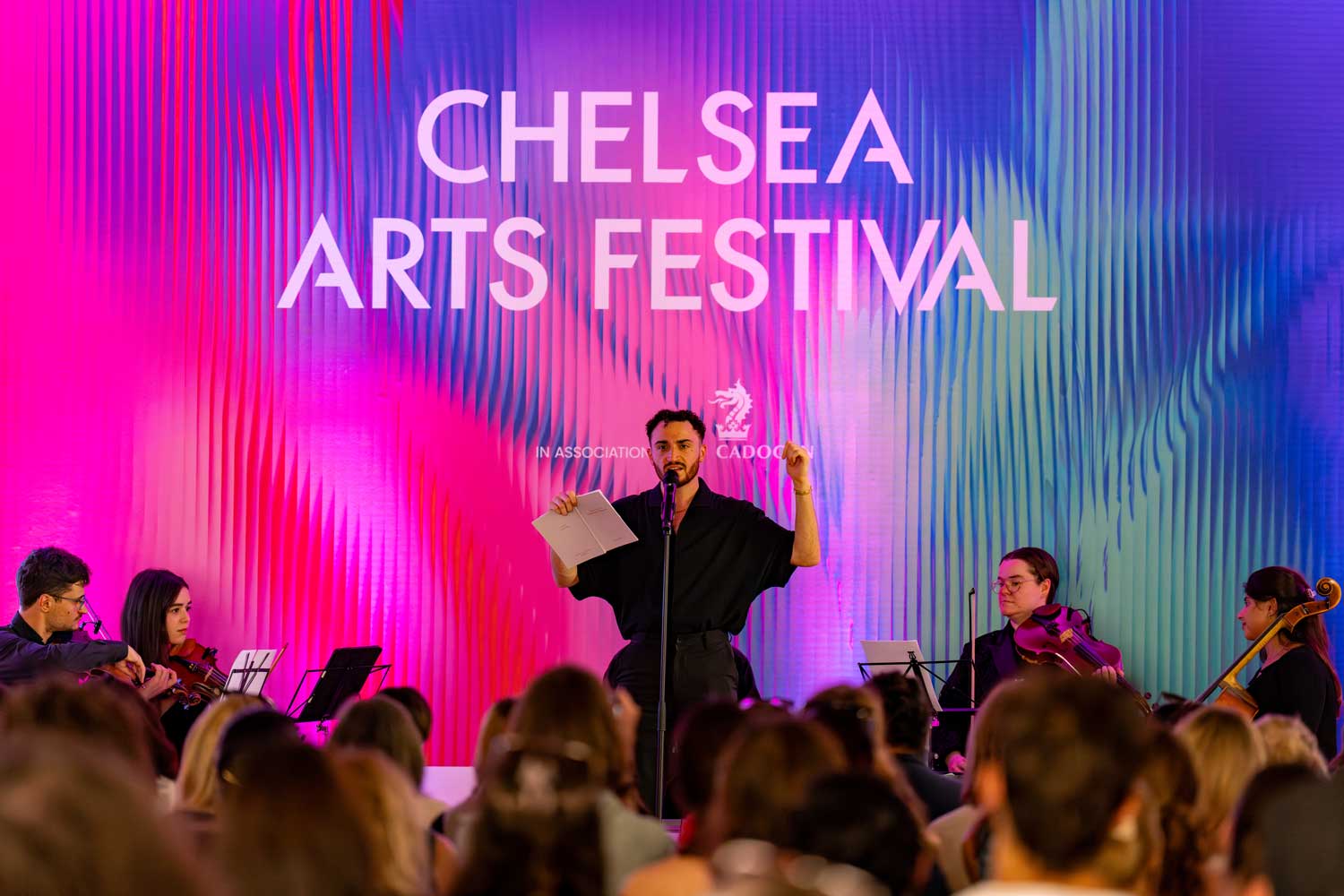
Lucas Jones
Performance and Q&A with Actor and Poet, Lucas Jones
Poet Lucas Jones made his live performance debut at his sold-out Chelsea Arts Festival show, reading poetry to a stunning live classical orchestra soundtrack at the Saatchi Gallery. The session was one of the most moving on the roster, with the poet’s emotive verses spanning themes of politics, masculinity, and love, the writer’s vulnerability evident in his work and his performance, as he told the crowd he was so nervous beforehand he wanted to cancel.
Thank goodness he didn’t; his show was a reminder that there is good to be found on what can feel like a toxic social media landscape, one that has proved toxic to Jones himself at times. ‘When I put my work online there was nothing but hate for the first 3 months, nothing but death threats,’ he told the audience, before sharing that to counteract this, he’s received messages from followers who have revealed that his poetry has reached them in their darkest hours, preventing them from taking unthinkable action. Speaking afterwards he told us that ‘live culture [like this Chelsea Arts Festival show] is everything. It’s life and death to me.’ And it’s clear from this story that the impact of Lucas’ art can be just that to his fans, too. By Rebecca Cox
Read more about Lucas’ performance in our full write-up, here.
‘Writers are the memory keepers – what we don’t remember, we cannot repair.’ Elif Shafak in conversation with BookBar
The celebrated Turkish-British novelist began by explaining – for those who haven’t read it – the premise of her most recent novel, the multilayered There are Rivers in the Sky. It’s a broad canvas that leads readers across centuries, cultures and continents but it began with a small idea – when a raindrop landed in her palm as she was walking by the River Thames. ‘I looked at this raindrop and thought, ‘Can I tell its story?’” A drop of water links the strands of the book and its three characters, who, we discover by the end, are all connected in a surprising way.
Shafak was being interviewed by Chrissy Ryan, founder of BookBar, a space to gather and discuss books over a glass of wine, join a book club or hear an author in conversation, which this summer opened its second location, in Chelsea.
Shafak, who has written 21 books (13 of which are novels) and been translated into 58 languages, shared with a rapt Saatchi Gallery audience why she feels books still play such a crucial role in our culture. ‘Writers are the memory keepers – what we don’t remember, we cannot repair. My country has been shaped by collective amnesia: there is a lot of forgetting and ruptures.’ Having felt ‘other’ all her life, she continued, she feels an instinct to represent marginalised people in society. ‘Literature helps us re-humanise things that have become dehumanised. In today’s world, we have way too much information and not enough wisdom. We need to bring the heart into the conversation.’
In an era of instant gratification and AI, does she fear the death of the novel? ‘Of course, but I also see the opposite is happening. The faster our world spins, the deeper our need to slow down and re-think. Literature helps us do that.’ At conversations like this one at Chelsea Arts Festival, she sees more young people – men and women – and she feels encouraged. ‘There are days when I feel anxious and demoralised and what matters, as James Baldwin said, is we keep reading.’ Graphic novels, cookbooks; anything that speaks to us. ‘We are living in the age of angst, but if we stop and read we realise we are not alone.’ By Lucinda Baring
Ronnie Scott’s Presents Funk & Soul with Ashton Jones
Day two of the festival ended with a bang (and a boogie) at Cadogan Hall, where Ashton Jones and a ten-piece band brought a whirlwind of jazz, funk and soul to Chelsea. Look around within the first five minutes and you wouldn’t have spotted a still foot in the hall – whether quietly tapping along or going all out moving to the music, every member of the audience was infected with the electric energy of the evening.
An hour (and a bit) at Ronnie’s of course meant a stellar set, and as well as playing The Ashton Jones Project originals, the ensemble turned the evening into a real celebration with songs by Jones’ own musical influences: Prince, Earth, Wind & Fire, and Stevie Wonder. ‘The word legend gets thrown around quite a lot these days,’ Jones mused while introducing Stevie Wonder’s Contusion, ‘but this guy… he really is a true legend; I’m standing in the spot where he once stood.’
While most of the evening had the audience up and dancing like no one was watching, Jones also made sure to remind us of his almost impossibly powerful voice with an ardent rendition of Burt Bacharach’s classic ballad A House Is Not A Home. He only performed the song for the first time a couple of weeks ago at Ronnie Scott’s after always wanting to do it, he admitted. And it was undoubtedly one worth waiting for – for him, yes, but for us? Absolutely. By Evie Calver
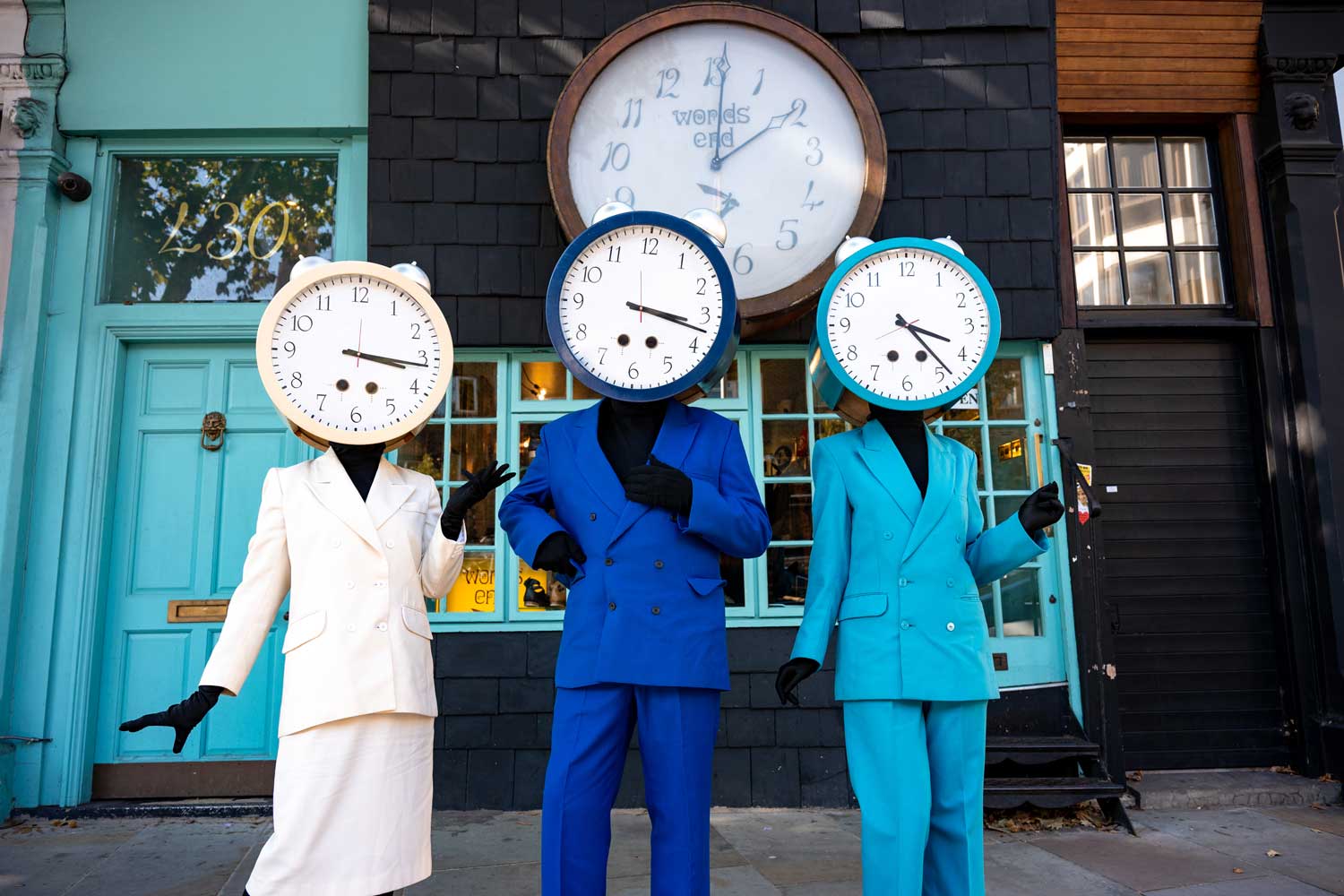
National Theatre Company – Clock Heads
What’s Happening Today?
Bring on the weekend! In its biggest day, on Saturday 20 September Chelsea Arts Festival is bringing the following to West London:
- Free workshops for young ballerinas courtesy of the English National Ballet School (free, book here) followed by a special family-friendly performance from the company’s young artists at Cadogan Hall (£7.50 for children, £12.50 for adults, tickets here).
- Arts Council chief exec Darren Henley delves into the value of culture with multidisciplinary artist LionHeart and celebrated broadcaster Samira Ahmed (from £12.50pp, tickets here).
- Ekow Eshun and Katy Wickremesinghe discuss the artist’s new book Black Earth Rising (£12.50pp, tickets here)
- Kate Bryan and David Shrigley celebrate their new book and share how we can all get to grips with art (from £12.50pp, tickets here)
- Artists Alison Jackson and Philip Colbert take to Saatchi Gallery (£12.50pp, tickets here)
- A screening of fashion documentary Twiggy at Everyman Chelsea (£25pp, tickets here), followed by Quant (£20.90pp, tickets here), both ending with a live Q&A.
- An afternoon celebrating British film and TV with Sally Phillips, Sadie Frost, Dr Nitin Sawhney CBE and Twiggy at Cadogan Hall (from £12.50pp, tickets here)
- A celebration of fashion and self expression with Zandra Rhodes and Daniel Lismore (£12.50pp, tickets here)
- The internet’s resident librarian Jack Edwards interviews award-winning Palestinian author of The Coin Yasmin Zaher (sold out)
- Rising star Ambika Mod joins David Byrne and the London Theatre Review podcast team for a live recording at the Royal Court Theatre (£14pp, tickets here).
- Allie Esiri brings her 365 Poems for Life to the Royal Court with the help of actors Susan Wokoma, David Morrissey, Kate O’Flynn, Rory Kinnear and more (from £24pp, tickets here).
- The Chelsea Arts Festival comedy gala featuring Sindhu Vee, Daniel Foxx, Shazia Mirza, Michael Odewale, Lloyd Griffith and more, raising funds for Nucleo (from £12.50pp, tickets here).
PLUS: free-to-see live music and dance performances on Sloane Square bandstand; roaming street performers; painting sessions at Art Play; a special reading challenge courtesy of Kesington and Chelsea Library; and a special food market in Duke of York Square.
For a full rundown of Chelsea Arts Festival 2025, visit our full day by day guide here.

